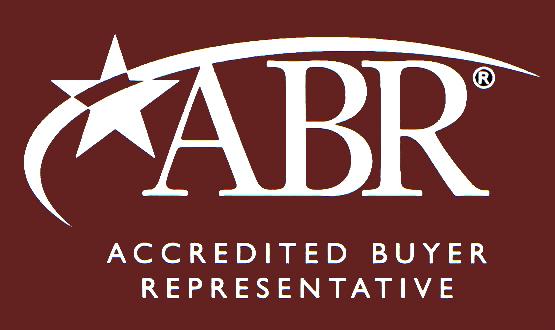Accredited Buyer Representative / ABR

Why Use an ABR®: REALTORS® Experienced in Buyer Representation
Buying a home is no small matter. Besides being the largest financial transaction you may ever undertake, it’s probably also the most complex.
There are many good reasons to work with a qualified real estate professional—especially a trained professional who has earned the
Accredited Buyer’s
Representative (ABR®) designation, representing
best-in-class buyer services.
When you look for an ABR® before you
look for a home, you’ll be served, not sold. Your interests
become their interests. And you’ll be
working with someone who has gone the extra mile by completing specialized training in delivering the best in buyer-representation
services. Plus, a REALTOR® who has an ABR® Designation also has an established track record, with proven experience in representing
the concerns of homebuyers.
The ABR® Designation is awarded
through the
Real Estate Buyer’s Agent Council,
or REBAC, which was founded in 1988 to promote superior
buyer-representation skills and services. REBAC is an
affiliate of the
National Association of REALTORS®
(NAR).
Descriptions of Agency: The Buyer Agency
Agreement
There are agents, and then there are agents. Yes, it sounds confusing. That’s because the term “agent” is often used in a casual manner,
referring to any real estate
practitioner.
But agent also refers to
someone with whom you’ve established a formal
agency relationship—someone who represents your
best interests in a real estate
transaction and owes you fiduciary responsibilities. Agency relationships are usually established in writing with buyer agency agreements, and require:
- Loyalty
- Obedience
- Disclosure
- Confidentiality
- Reasonable Care and Diligence
- Accounting
The birth of buyer agency
For many years, real estate was practiced in such a manner that agency relationships were only extended to sellers. Any real estate agent who brought
a
buyer to the table was actually working as a
sub-agent to the seller.
This all began changing in
the 1980s, when buyer agency started gaining
momentum in residential transactions. Today,
agency laws still vary from
state to state. But even if you live in a state that recognizes buyer agency, you can’t assume that you will automatically receive fiduciary
responsibilities
from the agent you’re working with as a
potential homebuyer.
That’s why it’s vitally
important to talk to the agent or broker early
in your working relationship about his/her
agency status. You may also want to
consult your state association of REALTORS® to gain a better understanding about agency laws in your particular state, or contact the
agency charged
with regulating real estate professionals in
your state, often referred to as the state real
estate commission.
Details vary from one
state to another, and each brokerage has its own
contract terms within these broader guidelines.
But for purposes of
illustration, this table outlines how your status may affect the level of service to which you are entitled:
|
||||||||||||||||||||||||
You may not know if you’re a customer or a client.
Depending on the laws in your state, you may find yourself working with someone who is actually negotiating
for the seller, not you the buyer. The best way to be certain your interests are being considered and protected
is to sign a buyer agency agreement with a trained buyer’s rep, which clearly establishes client-level services
and spells out what services you can depend upon.
What about dual agency?
In some cases, it will become necessary for your real estate professional to deviate from the single agency model. For example, a buyer-client may
become interested in a house that also happens to be offered for sale by a seller-client of their buyer’s rep, or by the same brokerage firm.
How
can a buyer’s rep, in this instance, maintain
complete loyalty to their buyer if he or she
also owes complete loyalty to the seller?
Obviously, they can’t.
But, depending on the real estate license laws
in your state, and your status with the
brokerage firm, the manner in which
this situation is handled will vary. To get concrete answers, you should read and discuss the brokerage services disclosure statement, which should
reflect your state’s agency law. If your agent hasn’t supplied a disclosure statement, you should ask for it. It spells out the different categories of
agency services they
provide and how they address dual agency.
Almost all states require
disclosure of dual agency and often require that
a buyer’s rep (or his or her brokerage firm)
only act as a dual agent
with the written consent of all parties to the transaction. In such a situation, the brokerage agrees to endeavor to be impartial between both
parties and will not represent the interest of either party to the exclusion or detriment of the other party. Neither will they share the confidential
information of one party with the other party. This is how brokerage firms and their agents strive to create win-win situations for everyone involved.
There are a few states that prohibit dual agency even with disclosure and consent.
Other types of relationships
Some states also allow different types of relationships beyond agency relationships. For example, a transaction broker assumes responsibility to facilitate
the
transaction, rather than represent one side over
the other. Further obligations may also be set
forth in a written contract with a client.
Even though the laws
concerning agency can vary from one state to
another, one thing that is constant throughout
the U.S. is the obligation
for all REALTORS® to comply with the National Association of REALTORS® Code of Ethics.
Issues to discuss with a buyer’s representative
Real estate agency relationships, like all business relationships, can be formed in a number of ways. In order to help talk through your options,
here are several questions to ask your buyer’s rep:
- Do you represent buyers, sellers or both?
- What services are provided to (or excluded from) me, based on my status as a buyer-customer or buyer-client?
- When does representation begin? When does it conclude?
- If I’m not ready to commit to your normal term, can you offer me a one-day buyer agency agreement or a 24-hour opt-out clause?
- How is dual agency addressed in your firm?
ABR®
vs. Buyer's Rep: A REALTOR® Designation
A buyer’s representative (or simply buyer’s rep) is a licensed real estate professional who represents prospective homebuyers in their property transaction.
If you’ve formalized an agency relationship, typically by signing a buyer’s rep agreement with a buyer’s rep, you can expect him or her to:
- Understand your specific needs and wants, and locate appropriate properties.
- Assist you in determining how much you can afford (pre-qualify your mortgage).
- Preview and/or accompany you in viewing properties.
- Research properties, to identify any problems or issues you should consider.
- Advise you in formulating your offer.
- Help you develop your negotiation strategy.
- Provide a list of potential qualified vendors (such as inspectors, attorneys, lenders, etc.) for other related services that may be needed.
- Keep track of all the details throughout the entire transaction—to closing and beyond.
In other words, a buyer’s
rep should make your home-buying experience go
as smoothly and successfully as possible.
But not all buyer’s reps
are equal. A buyer’s rep who has earned the
Accredited Buyer’s Representative (ABR®)
REALTOR® designation has made
an extra effort to raise the bar, with additional training and experience in serving you, the homebuyer. If you work with an ABR®, you can feel
more confident that you’ll receive the highest level of buyer-representation services.









